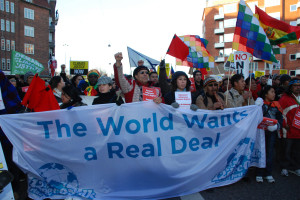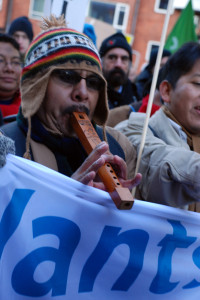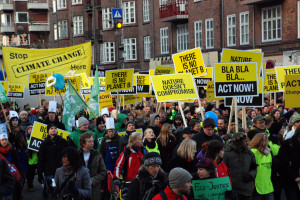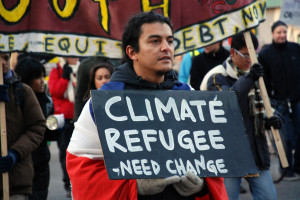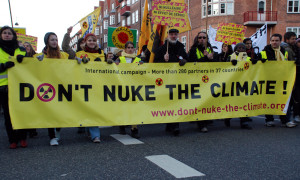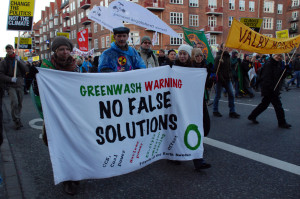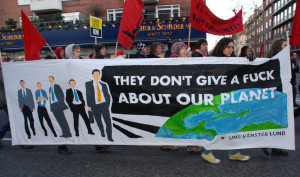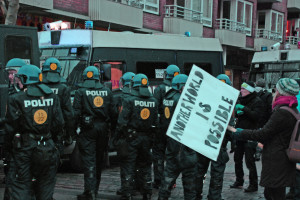
Protest outside of a Norwegian government meeting to promote "Reducing Emissions from Deforestation and Degradation" (REDD) in Oslo, Norway highlights the social and ecological costs of the REDD scheme and draws attention to a scandalous Norske Hydro project that threatens to destroy Amazon rainforest in Brazil. Photo Courtesy: Friends of the Earth Norway
Anne Petermann Reports from London
Highlights Include–
• Norwegian Government Scandal in the Amazon Rainforest
• Links Between Climate and Trade
• Pacific Islander Denounces False Solutions to Climate Change
• Genetically Engineered Trees
London, England–In today’s blog post I am going to relate some of the presentations of my colleagues on the GE Trees and Bioenergy Tour which they today here in London.
The first presentation was by Almuth Ernsting of BiofuelWatch, a UK-based organization with an office in the U.S. BiofuelWatch is very focused on trying to stop the UK from the massive increase it has planned in wood-fired electricity plants.
Some of the main points of Almuth’s presentation:
The amount of electricity the UK generates using wood is projected to increase 3.5 times by 2020.
The vast majority of this wood will be imported.
Industry likes to promote the idea that they will be using wood residues (sawdust, etc), but the reality is, demand will be met by whole tree removal logging—logging that involves the entire tree from leaves to roots, which severely compacts and depletes the soil.
Much of the wood imported by the UK is currently coming from North America. Future imports are also planned from South America and the Baltic states.
Almuth concluded by showing a graphic from Science magazine which forecasts that the massive global increase in demand for wood-based energy will require so much land that it will lead to a total loss of natural forests and grasslands by 2050.
The next presentation by Simone Lovera, the Executive Director of Global Forest Coalition, who showed the powerpoint presentation created by Camila Moreno, who was still in Oslo fighting the good fight against REDD at a meeting on the subject convened by the Norwegian government.
Simone emphasized that the industry PR claiming that bioenergy crops will be grown on marginalized land is a myth. She pointed out that this marginal land is never in the UK, it is always in Africa and South America—places where people are trying to reclaim their lands before they are classified as degraded land and given away for bioenergy plantations. Water is also a crucial issue. Eucalyptus and other monocultures for bioenergy are very water intensive.
Another project she highlighted as absolutely a scandal. The Norwegians took over a 91% share in the largest aluminum smelter in the world as well as one of the largest bauxite mines—both in the Brazilian Amazon—and plan to power them with wood-based electricity and a new hydro-electric dam—the notorious and highly-controversial Belo Monte dam (See Video). Aluminum smelters use enormous amounts of electricity and require huge quantities of water. So while the Norwegian government is promoting “reducing emissions from deforestation,” a Norwegian company (48% state owned) Norske Hydro is simultaneously planning a huge project that will both drown vast areas of Amazon forest and burn mountains of trees.
Meanwhile, the timber industry is being rewarded for their extremely poor land stewardship (consisting primarily of expanding monoculture tree plantations and destroying native forests), with subsidies from governments both for the pulp itself (as so-called “renewable” energy) as well as from the REDD scheme.
She pointed out that in this alarming trend, communities, local cultures, and biodiversity are being lost. But the good news, she said, is that people are retaliating and taking over their lands again. Tupinikim and Guarani as well as the MST and the Women of La Via Campesina have taken direct action against eucalyptus plantations in Brazil.
Certification, she insisted, is not an option. Millions of hectares of monoculture tree plantations will always be destructive. You cannot certify overconsumption.
In conclusion, she asked the question, which future do you prefer? The future of monocultures or the future of diversity?
Mary Lou Malik, the Trade Campaigner for Focus on the Global South presented on the link between trade and climate change.
She began with the premise that corporate globalization is pushing the ecological impacts of the planet, and that 1/3 of trade is for non-essential goods or goods that don’t need to be imported in the first place.
The global economy, she pointed out, is causing poor countries to focus on cash crops for export that cannot be eaten, so that when trade crashes due to an economic downturn, their income dries up and people starve. Demand for biomass from Southern will exacerbate this problem by turning more agricultural land into tree plantations.
WTO connection to the climate:
Those that are driving the false solutions are the same as the ones driving the free trade system.
How free trade prevents action on climate change:
1 The attempt by countries to create “green” standards and prohibit the import of non-energy efficient products is being rejected by the big countries in the WTO who threaten to cut off the market access of those smaller countries .
2 Through the liberalization of “Environmental goods and services”—that is supposed to allow clean technologies to flow from the North into the South. However, most of the products that are included under this are actually fossil fuel-based, dirty or controversial (false solution) technologies. Northern governments are already required under Kyoto to transfer clean technologies. But putting it under trade means that recipient countries are required to give something up in return (the essence of trade).
3 TRIPS—Trade Related Intellectual Property Rights: Relevant again to climate because the newest clean technologies are all patented, ergo exorbitantly expensive and inaccessible to poor countries.
4 Trade Rules trump all other rules because they are legal and binding, whereas the UN climate agreements are non-binding. Therefore trade rules always come out on top. UNFCCC Article 3 states clearly that measures taken to address climate change should not constitute disguised barriers to trade. Trade comes first. Period.
5 Pushes “solutions” to be market-based.
What we need to do:
• Change Trade not the Climate
• Get rid of market-based and other false solutions
• Refocus trade to promote transfer of clean technologies, etc.
The final presentation of the day was by Fiu Mataese Elisara, who explained the impacts of climate change and false solutions from the perspective of the peoples of the Pacific. I will try to keep this report as much in his own powerful words as possible.
The countries of the Pacific occupy 1/3 of the surface of the globe. Ninety-five percent of the people in the Pacific are Indigenous. We are not responsible for the crisis, yet for us it is a matter of life and death. For this reason, when you talk about geoengineering, REDD, bioenergy and other false solutions, we are very worried, because they will not solve the problems. We have to keep the temperature rise well below 2 degrees. Yet the new Copenhagen Accord is predicted to lead to 4 degrees rise in temperature.
We need reductions of 80-90% of emissions by 2050 to save our islands.
Bioenergy and REDD (paying people who want to cut their forests) will make the problem worse, not better. The conservation of native forests is done by Indigenous Peoples. But under REDD, you have to be a deforester first before you can benefit. So the peoples who have conserved forests are left out. There are no guarantees that after the countries have been paid they won’t deforest a few years later anyway. Then there’s also the problem of forest definitions. We get crucified by forest definitions. When the UN allows plantations and Genetically Engineered trees to be called forests, it’s a major problem.
There is also the problem of sustainable development in the South, which is focused exclusively on economics—not on social or environmental values. Plantations funded under the CDM [through the Kyoto Protocol—ed.] are killing people whose forests are being taken away. These negotiations are violating our rights and that climate money is literally killing our people. The extremes in weather are also killing our people—the increase in number and severity of cyclones, for example.
Bioenergy is going to be more destructive than fossil fuels. Land grabbing is becoming a major problem in the Pacific as well. Eighty percent of our lands are Indigenous lands, and the opening of these lands to investors is going to devastate our people.
This is a collective issue. It’s good we are aligning but we have a big challenge ahead of us so let’s figure out how we can work together to address this problem—to confront the World Bank and the other forces causing this problem.
We have to go out to the communities and tell them the other side of the story, so they know what is possible, and not just what the government or companies tell them. And when we tell them, they get angry. The students get angry and then they get involved.
This is how it can change.
Anne Petermann is the Executive Director of Global Justice Ecology Project and is reporting everyday from the GE Trees and Bioenergy Tour in Europe. Anne also is the Coordinator of the STOP GE Trees Campaign. Stay turned to Climate Connections for her posts.





